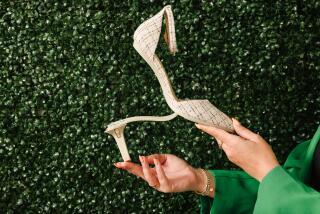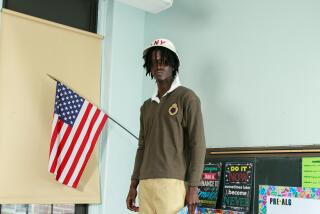The Rag Trade : A Greek Immigrant’s Street Smarts Steer Cherokee Clear of Pitfalls in Apparel Industry
- Share via
When the boss sells most of his stock, why should anyone else want to buy it? Early last year James Argyropoulos, founder and chairman of Cherokee Group, a trendy North Hollywood-based maker of women’s clothing and shoes, counted 32% of the company’s stock as his own. After the company’s sale of more stock to the public last month, he now owns about 15% of Cherokee.
It wasn’t just the chairman who was selling. Arthur Argyris, his twin brother (who changed his name) and heads Cherokee’s shoe division, owned 8% of the stock last year. Now he’s down to 1%. And Cherokee president Robert Margolis’ holdings have dropped from 6% to 1%.
“You’re worth millions and millions on paper, but you really can’t take it home. You can’t build a house with it, you can’t buy things for your family. You’ve got 95% of your assets in something you can’t even use. I’m 43 years old, I want a little better life, a different house. I want to take care of my family,” Argyropoulos said. “What are you going to do, borrow against your stock? I don’t believe in that.”
Insider selling is often a tip-off to bad news. Do the Cherokee chieftains know something everyday investors don’t? It certainly doesn’t look like it.
For one thing, the company is working off a record $71-million order backlog, up 86% from the previous year. And Cherokee’s first-quarter earnings were up 42%.
The executives’ stock sale may, as much as anything, be a comment on the erratic nature of the “rag” trade, as well as the unconventional nature of Cherokee, which is run by a Greek immigrant with a high-school education who relies on his street smarts instead of MBA manuals.
In the past decade, for example, far more celebrated brand names than Cherokee have gone into unexpected slumps. Levi’s, Izod (with the alligator) and Munsingwear (with the penguin), have all endured slowdowns because of misjudging the market or fickle consumers. Cherokee could suffer the same problem.
Granted, the 15% of Cherokee stock Argyropoulos still owns is worth, after Friday’s close of $19 a share, about $35 million. But he seems to feel even safer in real estate.
“I’m an immigrant. I like to get hold of it,” he said, grabbing a desk in his office. Real estate records show that he, or his partners, own about three dozen pieces of real estate from Santa Barbara to Venice, including homes, stores, apartments and a parking lot.
Young Argyropoulos grew up in Chicago after his father moved the family there from Greece. Later he headed for Los Angeles with his guitar and dreams of becoming a famous rock musician. In 1968, when his wife was pregnant, he gave up music, borrowed $700 and opened a shoe repair shop in Venice. Then he started making sandals for customers.
In 1973 he rented a garage and went into shoe making full time. Some of his shoes had an Indian motif, thus the Cherokee name.
He teamed up in 1981 with Robert Margolis, who had built and sold a successful jeans company, A. Smile, and that year Cherokee moved into clothing, selling casual medium-priced jeans and pants for women. Last year, 78% of Cherokee’s $104-million sales came from clothes, as Cherokee turned a $6.8-million profit.
But there’s pressure on Argyropoulos to keep producing. Cherokee’s stock has a lofty 33 price-earnings ratio, double the market average and higher than two more celebrated firms closing in on $1 billion in sales: Liz Claiborne and The Gap, which owns the popular Banana Republic store chain.
Argyropoulos has kept broadening the Cherokee clothing line. His company made its debut producing clothes for 16- to 22-year-olds, but now turns out clothes for the 22- to 40-year-old market, as well as apparel for large women, a hot market.
Cherokee already has its clothes on the shelves of leading chain stores, such as Mervyn’s and Macy’s--Cherokee’s two biggest clients--plus Broadway and Nordstrom. And Cherokee has been making private-label clothes for mass merchandisers such as Sears and Wal-Mart.
“Cherokee is doing things similar to Liz Claiborne, leveraging that mass consumer acceptance into other areas,” said Richard Edelman, an analyst with Southwest Securities.
For all the new clothes, however, Cherokee is trying to hold its place in the rag trade a full step below Benetton and Esprit in both price and fashion. Cherokee leans toward cotton goods, casual looks, heavy on the pastels and moderate prices. In its own stores, 80% of what Cherokee sells costs under $40.
“We’re not blazing trails in fashions,” Argyropoulos said. “We’re middle America, we’re apple pie.”
Although Cherokee has 10 stores, most of them in Southern California, and has begun franchising stores out of state--investors will pay Cherokee 4% of the gross sales--the stores are only a fraction of its overall business.
Bonanza in Licensing Name
A more successful diversification has been Cherokee’s licensing of its name. Vendors paid Cherokee $1.5 million in royalties last year, and Cherokee expects to sign a licensing deal soon with a Japanese shoe company. Analyst Edelman believes more export licensing is likely. The Cherokee logo, an Indian in headdress, plus the tag line, An American Original, “is a fantastic franchise in itself,” he said.
Equally impressive has been the company’s flinty cost-watching. Selling, general and administrative expenses have actually fallen slightly as a percentage of sales in the last three years, while sales have jumped 44%.
Unlike many of its rivals, most of Cherokee’s shoes and clothes are made in the United States. Instead of building up big stocks of clothes in advance of the fashion season, Cherokee essentially produces only to specific order and farms out much of the final production work to Los Angeles-area subcontractors who tap a large pool of immigrant seamstresses.
“We don’t believe in inventories,” Argyropoulos said. Cherokee, however, does stock up on raw materials, cotton, denim. Styles come and go, but this way Cherokee can survive color whims.
“If turquoise is hot this year, we finish it in turquoise. At the end of the season, if we’re stuck with anything, it’s raw goods. We can die it pink for next season,” Argyropoulos said.
Has Big Plans
A wiry, small man with slicked-back hair and the accent of his homeland, Argyropoulos is an energetic sort. Whenever a company grows as fast as Cherokee, the obvious worry is losing control. In one breath Argyropoulos talks of holding down costs, and in the next breath he talks of Benetton, the Italian sweater king, which has 4,000 stores in 60 countries, and how he’d like to have 1,000 franchised and company-owned stores.
“Maybe a mistake for them would be to think, ‘let’s build some inventory in advance.’ That could be a mistake if their egos take over,” Edelman said.
Certainly the atmosphere at Cherokee is frenetic. In the lobby one recent morning, a city inspector came by to check two trailers the company needs to use as temporary office space. Cherokee plans to move to a more spacious 10-acre headquarters site in Sunland next year.
In the old North Hollywood headquarters, employees stream by, most of them young, dressed attentively casual, much like Argyropoulos, who wore black Cherokee jeans--no belt hiding the precious label--with rolled up pant legs, white shirt and socks, and brown ostrich loafers.
Something else many at Cherokee have in common is money. The corner parking lot looks like a snapshot of the autobahn for all the BMWs, Mercedeses and Porsches. The company has a bonus plan that, in keeping with Argyropoulos’ immigrant style, pays cash, not stock. Three dozen key employees, he said, share in a profit pool. Those in the apparel group, he said, have earned bonuses equal to 100% of their salary in each of the past three years.
Analysts like Cherokee’s chances to keep growing, at least for a while, because the brand isn’t particularly well known in the East. If everything keeps clicking and the stock jumps, won’t Argyropoulos and his crew regret having sold so much?
“We’re not greedy,” he said.
CHEROKEE GROUP AT A GLANCE
Cherokee Group, based in North Hollywood, is a maker of shoes and clothing, and operates 10 clothing stores. Cherokee has 630 employees and 13.2 million shares of common stock outstanding.
More to Read
Inside the business of entertainment
The Wide Shot brings you news, analysis and insights on everything from streaming wars to production — and what it all means for the future.
You may occasionally receive promotional content from the Los Angeles Times.











